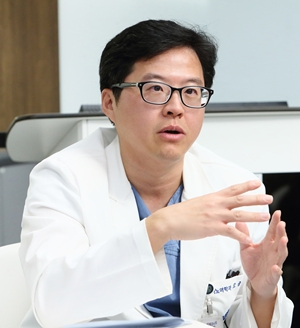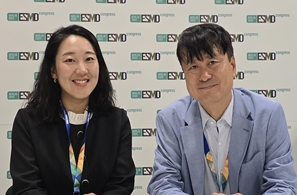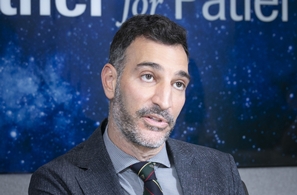- Opdivo prolongs survival in urothelial carcinoma
- by Whang, byung-woo | translator Alice Kang | Feb 18, 2025 05:53am
With the number of options available in the clinical setting increasing, there is also growing concern over when and which treatment to select for the patients.
However, experts believe that the choice of treatment that can maximize the effectiveness of the treatment is important, as the prognosis of urothelial carcinoma is still worse than that of other urologic cancers.

Urothelial carcinoma is a cancer that starts in the urothelial cells that line the inside of the bladder, and 90% of tumors that occur in the urinary tract are urothelial carcinoma.
It is the most common type of bladder cancer, accounting for about 90% of all bladder cancer diagnoses. Even if patients undergo surgery, their life expectancy is not long, and the average overall survival period is just over one year, especially for patients with metastases.
“In the first diagnosis, about 10% of patients with metastatic urothelial carcinoma are confirmed to have metastatic disease, and if adding patients whose cancer progressed or metastasized, 20-30% of all patients are confirmed to have metastatic disease,” said Professor Oh. “There may be microscopic metastases that are not detected by imaging tests, so the actual proportion of metastatic urothelial carcinoma may be higher than the confirmed proportion.”
The chemotherapy combination of cisplatin and gemcitabine (GemCis) had been the representative treatment option. However, Professor Oh explained that the combination had clear limitations, such as response rate and toxicity.
“The percentage of patients responding to gemcitabine is not high, and the duration of response is very short, less than a year, and the toxicity is strong, so patients cannot continue treatment for a long time,” said Professor Oh. ”Since urothelial carcinoma is a tumor that occurs in the urinary tract, many patients have reduced renal function, such as by having their kidneys or bladder removed.”
The emergence of immune checkpoint inhibitors for urothelial carcinoma is expected to extend survival
In this situation, the emergence of new drugs, including immune checkpoint inhibitors, is expected to extend patient survival.
One of the recent changes is the approval of Opdivo (nivolumab) in combination with cisplatin and gemcitabine as a first-line treatment for unresectable or metastatic urothelial carcinoma in July.
Looking at the Phase III CheckMate-901 trial, which was the basis for the approval of Opdivo, at a median follow-up period of 33.6 months, the median overall survival (mOS), the primary endpoint, was 21.7 months with the combination of Opdivo and chemotherapy, which was significantly longer than the 18.9 months with the combination of cisplatin and gemcitabine, and reduced the risk of death by 22%.
“Opdivo is the first immuno-oncology drug approved for the first-line treatment of metastatic urothelial carcinoma. The combination of Opdivo and gemcitabine has extended the overall survival by about 3 months compared to the existing gemcitabine monotherapy,” said Professor Oh. ”This means that we have an opportunity to extend the expected life expectancy that has been around one year with the existing treatment to about one and a half years.”
So, how has the actual prescription experience been for domestic patients? Professor Oh expected that Opdivo would play a role in the situation where most patients with metastatic urothelial carcinoma first experience lymph node metastasis.
He said, “In the subgroup with lymph node-only metastases, the rate of complete remission of metastatic lesions was much higher with Opdivo than with gemcitabine therapy, and the duration was also much longer. As the study confirmed very good effects, I think it is an effective treatment that can be considered as a first-line treatment for patients with lymph node metastases.
In fact, in the CheckMate-901 subgroup analysis, patients with lymph node-only metastases were compared between the combination of Opdivo and gemcitabine and Gemcitabine alone, and the median overall survival was 46.3 months for the combination of Opdivo and gemcitabine and 24.9 months for gemcitabine alone.
In response, Professor Oh said, “Lymph nodes are where the immune response is most active in our bodies, so it is thought that their response rate to immuno-oncology drugs such as Opdivo will be high. Patients with cancer that has spread to other organs have a much lower level of activity, but patients with lymph node-only metastasis have a relatively good overall condition, which may have a positive impact on treatment outcomes as they can receive treatment as planned.
In conclusion, in the first-line treatment of metastatic urothelial carcinoma, if the patient has a low tumor burden or lymph node metastasis alone, Professor Oh believes the relatively less toxic Opdivo-Gemcitabine regimen may be a useful option among the first-line treatment options.
"Will increase Opdivo’s use in lymph node metastasis alone and as adjuvant therapy"
In particular, Professor Oh focused on Opdivo’s use as adjuvant therapy based on the CheckMate-274 study.
“Currently, the standard adjuvant therapy for urothelial carcinoma is GemCis, but there are cases where patients undergo surgery after chemotherapy and the results of the biopsy are not good. In this case, the effectiveness of adjuvant gemcitabine therapy is low, and the disease usually recurs within 6 months,” explained Professor Oh.
“Since other therapies that can be tried outside of standard treatment for GemCis have not yet been established, this is a very unfavorable case, and we expect that the post-operative adjuvant therapy of Opdivo will be used most actively in such patients.”
However, Opdivo as adjuvant therapy for urothelial carcinoma is not reimbursed by Korea’s health insurance.
Professor Oh stressed the need for reimbursement of new drugs that can benefit patients with urothelial carcinoma, who have a short overall survival period and therefore are in urgent need of treatment.
He said, “For patients with poor post-operative biopsy results, we are trying to use Opdivo as adjuvant therapy if conditions permit. Since there is no alternative to adjuvant Opdivo therapy, patients are very desperate so healthcare professionals believe the drug is absolutely necessary.”
Finally, Professor Oh said, “The complete remission rate is about 40-50% with standard chemotherapy, but it can be improved to 60-70% with new drugs. I see the significance of its use as adjuvant therapy, and I hope that many patients will be able to use the drug without burden through prompt reimbursement.”
-

- 0
댓글 운영방식은
댓글은 실명게재와 익명게재 방식이 있으며, 실명은 이름과 아이디가 노출됩니다. 익명은 필명으로 등록 가능하며, 대댓글은 익명으로 등록 가능합니다.
댓글 노출방식은
댓글 명예자문위원(팜-코니언-필기모양 아이콘)으로 위촉된 데일리팜 회원의 댓글은 ‘게시판형 보기’와 ’펼쳐보기형’ 리스트에서 항상 최상단에 노출됩니다. 새로운 댓글을 올리는 일반회원은 ‘게시판형’과 ‘펼쳐보기형’ 모두 팜코니언 회원이 쓴 댓글의 하단에 실시간 노출됩니다.
댓글의 삭제 기준은
다음의 경우 사전 통보없이 삭제하고 아이디 이용정지 또는 영구 가입제한이 될 수도 있습니다.
-
저작권·인격권 등 타인의 권리를 침해하는 경우
상용 프로그램의 등록과 게재, 배포를 안내하는 게시물
타인 또는 제3자의 저작권 및 기타 권리를 침해한 내용을 담은 게시물
-
근거 없는 비방·명예를 훼손하는 게시물
특정 이용자 및 개인에 대한 인신 공격적인 내용의 글 및 직접적인 욕설이 사용된 경우
특정 지역 및 종교간의 감정대립을 조장하는 내용
사실 확인이 안된 소문을 유포 시키는 경우
욕설과 비어, 속어를 담은 내용
정당법 및 공직선거법, 관계 법령에 저촉되는 경우(선관위 요청 시 즉시 삭제)
특정 지역이나 단체를 비하하는 경우
특정인의 명예를 훼손하여 해당인이 삭제를 요청하는 경우
특정인의 개인정보(주민등록번호, 전화, 상세주소 등)를 무단으로 게시하는 경우
타인의 ID 혹은 닉네임을 도용하는 경우
-
게시판 특성상 제한되는 내용
서비스 주제와 맞지 않는 내용의 글을 게재한 경우
동일 내용의 연속 게재 및 여러 기사에 중복 게재한 경우
부분적으로 변경하여 반복 게재하는 경우도 포함
제목과 관련 없는 내용의 게시물, 제목과 본문이 무관한 경우
돈벌기 및 직·간접 상업적 목적의 내용이 포함된 게시물
게시물 읽기 유도 등을 위해 내용과 무관한 제목을 사용한 경우
-
수사기관 등의 공식적인 요청이 있는 경우
-
기타사항
각 서비스의 필요성에 따라 미리 공지한 경우
기타 법률에 저촉되는 정보 게재를 목적으로 할 경우
기타 원만한 운영을 위해 운영자가 필요하다고 판단되는 내용
-
사실 관계 확인 후 삭제
저작권자로부터 허락받지 않은 내용을 무단 게재, 복제, 배포하는 경우
타인의 초상권을 침해하거나 개인정보를 유출하는 경우
당사에 제공한 이용자의 정보가 허위인 경우 (타인의 ID, 비밀번호 도용 등)
※이상의 내용중 일부 사항에 적용될 경우 이용약관 및 관련 법률에 의해 제재를 받으실 수도 있으며, 민·형사상 처벌을 받을 수도 있습니다.
※위에 명시되지 않은 내용이더라도 불법적인 내용으로 판단되거나 데일리팜 서비스에 바람직하지 않다고 판단되는 경우는 선 조치 이후 본 관리 기준을 수정 공시하겠습니다.
※기타 문의 사항은 데일리팜 운영자에게 연락주십시오. 메일 주소는 dailypharm@dailypharm.com입니다.









